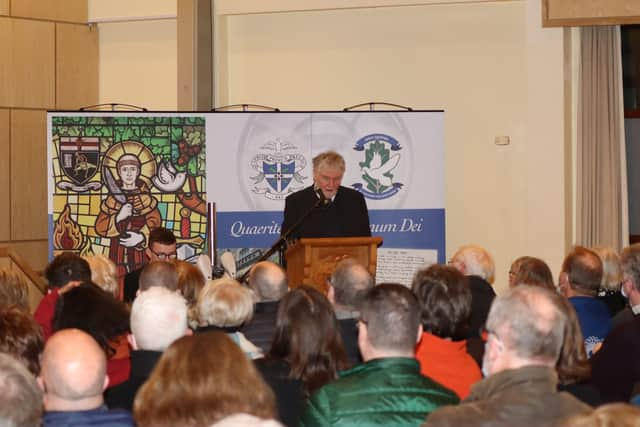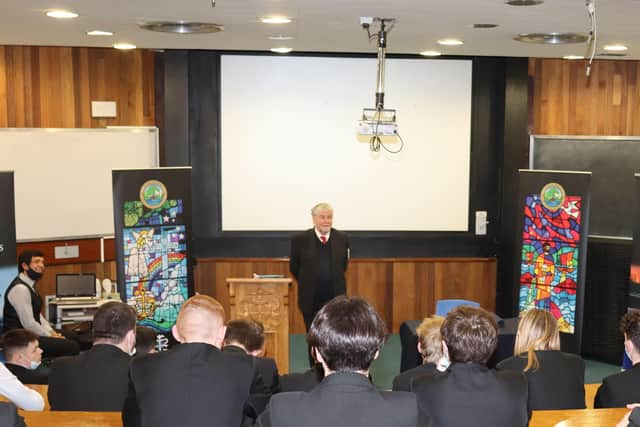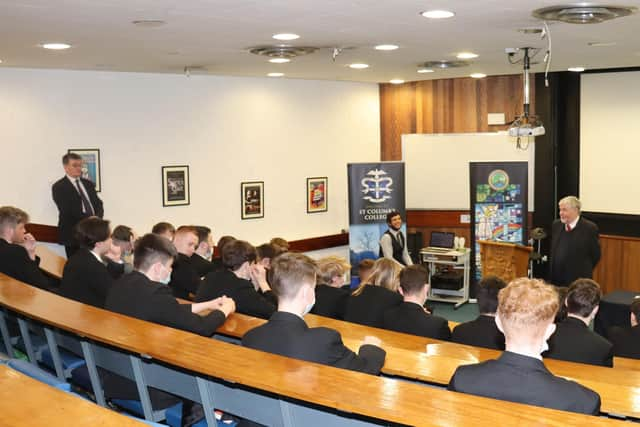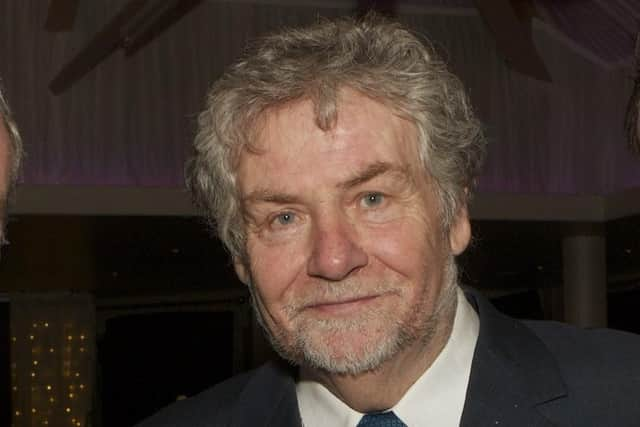The Derry man who met Putin
and live on Freeview channel 276
The speaker, Jim Sharkey, former Irish Ambassador to Russia and former St. Columb’s student, was back in his home town of Derry to talk about his Reflections on Russia.
If timing is everything then although this talk was booked months before, providence has landed the Columba organising committee with a major success in having such an eminent speaker at this time. Jim told us that when in Russia he and his wife Sattie could look down from their hotel room into Moscow’s Red Square where sits the Kremlin and the amazing multi-coloured minarets of St. Basil’s Cathedral and of course the scene of daunting military parades that mark Russia’s Victory Day celebrations.
Advertisement
Hide AdAdvertisement
Hide AdJim is no stranger to St. Petersburg, Putin’s birthplace - we talked of the world famous sculpture in the city’s renowned Hermitage Museum - Dead Boy on a Dolphin, and I was able to remind him that in a curious twist of fate the twin of this magnificent work of art sat for over a hundred years just a few miles from Derry in the Earl Bishop’s mansion on the Downhill cliff top.


Recalling this is not without irony for is it not amazing that out of rough pieces of rock human beings can fashion breath-taking beauty but equally human beings at the touch of a button can reduce beauty back into rubble and devastation as is happening now?
Jim Sharkey comes with a remarkable provenance not just as a diplomat of world-wide experience but as a man well versed in Irish history and in the Russian language and Russian affairs.
He had stints as a teacher in London, Derry and Dublin, before joining Ireland’s Department of Foreign Affairs in 1970. Jim was appointed Charge d’Affaires for the opening of the Irish Embassy in Moscow in 1974 and then served as Irish Ambassador in Australia, Japan and Denmark between 1987 and 2001. Thereafter, he returned to Moscow as Irish Ambassador. Meanwhile, Vladimir Putin had come to the fore under Boris Yeltsin and eventually became Prime Minister and President.
Advertisement
Hide AdAdvertisement
Hide AdIt was to Putin that Jim Sharkey presented his credentials as the new Ambassador.


Thus there is no better man than Jim to give a talk on Russia. In opening, and no doubt with his ambassadorial hat on, Jim mentioned the early Irish missionaries in Europe - men of the calibre of St. Gall and Columbanus (hero of the late Cardinal Ó Fiaich) who were ambassadors in their own way, as were the men of the ‘Wild Geese‘ who served with distinction in armies all over Europe.
Jim’s main aim was to give us a picture of what ultimately came to be called Russia - originally a part of Eastern Europe subject to the comings and goings of ancient warring factions with little known about their ethnic identity and cultures. According to legend, East Slavs founded Kiev in the 5th century and the name ‘Rus’, eventually Russia, appeared when settlers from Scandinavia held sway as centuries progressed.
The first known reference to Moscow dates from 1147. Moscow became a political centre for the unification of Russian lands and by the early 18th century Russia had expanded through conquest, annexation, and exploration, into the Russian Empire - so named by Peter the Great. Afterwards, under Catherine the Great Russia grew larger becoming one of the great powers of Europe.
Advertisement
Hide AdAdvertisement
Hide AdIn more modern times came the Russian Revolution in 1917, setting into motion political and social changes that would lead to the formation of the Soviet Union, officially the Union of Soviet Socialist Republics (USSR), a communist state existing from 1922 to 1991 - in effect a federation of 15 republics, one of which was the Ukraine we now hear about on the news. Finally, on 25 December, 1991, the Soviet Union was dissolved leaving the original republics now independent countries - this, according to Putin - ‘The greatest geopolitical tragedy of the 20th century.’ Many observers see these sentiments fuelling his drive for restoration of the original status.


In all then Jim Sharkey’s talk brought an understanding of the development of Russia, its trials and tribulations; and while it is part of Europe and wants recognition as such it also wants to preserve its own rich culture and identity. However, since 1991 America and NATO have felt it necessary to bolster up the independent states and thereby lie the roots of the present problems. The way Russia sees itself and the way America sees Russia is at odds - the outcome is mistrust.
My feeling is that Jim has a love of Russian culture, art and music - Tolstoy’s War and Peace got an airing, but what was admirable more than anything was his straight, unbiased approach, throughout. This was a speaker thoroughly in control of his topic - the product of knowledge and experience delivered calmly and expertly. In all an excellent piece of communication.
The talk made a superb contribution to the Columba series, the warm applause at the end an indication of this. In questions afterwards on the likely outcome of the current conflict in Ukraine Jim indicated that he was surprised that it had happened but was in no doubt that Russia should not have invaded.
Advertisement
Hide AdAdvertisement
Hide AdIn the end, I suppose we may only conjecture on the outcome - certainly ceasefire, talks, and then it is in ‘the lap of the gods’ - perhaps agreed neutrality?


As for the future we can only hope that when the skies clear and the sun shines again on the verdant uplands Jim will return to Derry with more intriguing stories of the Russia he got to know.
Full marks to the Columba organising committee for this ground-breaking series and likewise to the St. Columb’s students who marshalled proceedings so well and also provided refreshments afterwards - all of which added to a most enjoyable evening.
Note: The ‘Dead Boy on a Dolphin’ sculpture mentioned above was sculpted by Lorenzetto in the early 1500s from a sketch by the painter Raphael. It was refined by Cavaceppi in Rome in the 1760s and he gave permission for a copy to be made by the Anglo-Dutch sculptor Joseph Nollekens. The theme is popular in Roman mythology - the boy and the dolphin play in the sea but one day the dolphin’s dorsal fin cuts into the boy’s side and he drowns. Heartbroken the dolphin carries the dead boy to the beach and dies alongside him.
Advertisement
Hide AdAdvertisement
Hide AdIt is believed that the sculpture in the Hermitage is the original while the copy, itself priceless, was purchased by The Earl Bishop in Rome in the 1780s. It was exhibited at the Great Exhibition in Dublin in 1853 and after another sojourn at Downhill was given to the Earl Bishop’s ancestral home at Ickworth, Suffolk, in the 1920s.
Nathan Thiruvengadam, teacher, St Columb’s College advised: ‘Our next event in our Columba Celebrations is a talk and Q&A (followed by refreshments) by Dr Gary Wade on Seamus Heaney. This will take place on Friday 8th April in St. Eugene’s Cathedral Hall, Windsor Terrace. Tickets are free but to be reserved through columba1500@stcolumbscollege.org ‘